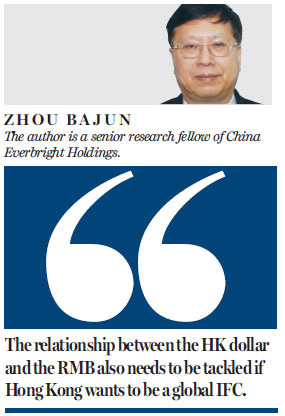Challenges facing HK in becoming a global IFC
Updated: 2015-12-09 09:12
By Zhou Bajun(HK Edition)
|
|||||||||
The International Monetary Fund (IMF) on Nov 30 approved the inclusion of the renminbi (RMB) in its Special Drawing Rights (SDR) basket. This was a milestone for China. The country worked very hard for years to have the RMB recognized as one of the world's leading global currencies. This further solidifies the country's determination to become an important part of the global financial system.
The weight assigned to the yuan upon its SDR debut is 10.92 percent, below the US dollar (41.13) and the euro (30.93), and above the Japanese yen (8.33) and the British pound (8.09). The international community recognizes the Chinese mainland's current status as the second-largest single economy. It welcomes the RMB's speedy rise to a widely used major international currency. For Hong Kong this is an opportunity to turn its current status as a regional international financial center (IFC) into a truly global one.
However, the SAR faces two daunting challenges if it wants to make its regional IFC status global. One is expanding the economic hinterland on which its financial markets rely. The other is to optimize the relationship between the Hong Kong dollar and the RMB.
As far back as January 2007, the SAR government wrote in a report on Hong Kong's development in relation to the nation's 11th Five-Year Plan (2006-2010) that Hong Kong's financial development suffered from the constraints of a small economy and also from competition from several regional IFCs. It was understood then that, apart from Tokyo, no other regional IFCs, such as Singapore, could become a global IFC. This was because of the size of their economies. Now, Hong Kong can overcome this by becoming part of the Pearl River Delta regional economy. But it has to be committed to removing all "boundaries" with the mainland - visible or otherwise.
The relationship between the Hong Kong dollar and the RMB also needs to be tackled if Hong Kong wants to be a global IFC. A global IFC must be in a country whose currency is widely used in financial activities around the world and constitutes a major part of foreign reserves of other countries. This means its national currency has to be in the SDR basket. The US dollar is above other major currencies in this respect. There is no comparison between the greenback and the British pound when it comes to being a preferred foreign reserve currency. But the latter is also in the SDR basket. Now the mainland has the opportunity to offer the world another global IFC because the RMB is in the SDR basket. It is expected to become an international currency and be widely used in foreign trade and financial exchanges. It will also be a major component in foreign reserves.
Shanghai has a goal of becoming a regional IFC focused on yuan-denominated transactions by 2020. If the city succeeds in achieving this it will no doubt have an edge over Hong Kong. It is very hard to imagine that the SAR can become a global IFC if it retains the Hong Kong dollar - which is unlikely to become an international currency.

(HK Edition 12/09/2015 page11)